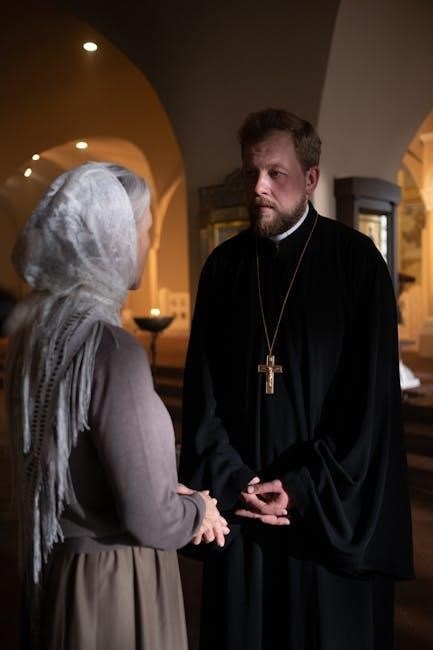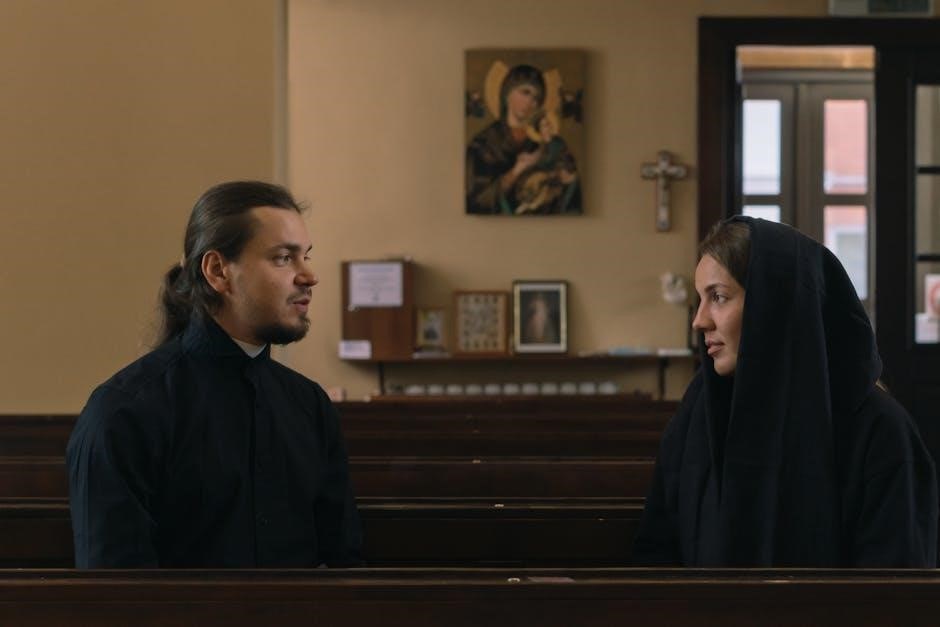confession guide orthodox
Orthodox Confession is a sacred sacrament where believers acknowledge their sins before God and the Church, seeking repentance, healing, and spiritual growth through sincere self-reflection and divine mercy.
1.1 What is Confession in the Orthodox Church?
Confession, or Repentance, is one of the sacred sacraments in the Orthodox Church, where believers acknowledge their sins before God and the Church. It is a profound act of self-examination, sorrow, and seeking forgiveness, essential for spiritual growth and healing. Through this sacrament, Orthodox Christians recognize their responsibility before God for their sins and strive to amend their lives. The priest acts as a witness and guide, offering spiritual advice and prayers for reconciliation. Confession is not merely a ritual but a heartfelt expression of repentance, aiming to restore the believer’s union with God and the Church. It is a mystery of healing, enabling the faithful to embrace a life of virtue and draw closer to Christ.
1.2 Why is Confession Important for Orthodox Christians?

Confession is vital for Orthodox Christians as it provides a means for spiritual healing, cleansing, and reconciliation with God. Through this sacrament, believers acknowledge their sins, express genuine repentance, and seek forgiveness, restoring their union with God and the Church. It fosters humility, self-awareness, and accountability, enabling individuals to confront their weaknesses and strive for moral and spiritual improvement. Regular confession strengthens the soul, offering guidance and grace to overcome sinful tendencies and live a virtuous life. It is a divine gift that helps Orthodox Christians grow in holiness, deepen their faith, and draw closer to Christ, ultimately preparing them for eternal life.

Preparation for Confession
Preparation for Confession involves self-examination, prayer, and awareness of sins to approach the sacrament with sincerity and readiness for spiritual healing.
2.1 Examination of Conscience
An essential step in preparing for confession is the examination of conscience, which involves reflecting on one’s thoughts, words, and actions to identify sins. This process helps believers recognize their spiritual shortcomings and take responsibility for them. By examining their conscience, individuals can approach confession with honesty and sincerity. This reflection is often guided by prayer and questions that prompt self-awareness, such as asking if they have been selfish, greedy, or dishonest. Writing down sins can also aid in thorough confession. This practice ensures that no transgressions are overlooked, fostering a deeper commitment to repentance and spiritual growth.

2.2 Prayerful Reflection and Self-Examination
Prayerful reflection and self-examination are vital in preparing for confession. This involves setting aside quiet time to commune with God, seeking guidance through prayer to uncover sins and weaknesses. By reflecting on thoughts, feelings, and actions, believers can identify areas where they have fallen short of God’s will. This process deepens self-awareness and fosters a sincere desire to repent. Prayerful reflection helps individuals acknowledge their sins honestly and humbly, preparing them to approach the sacrament of confession with openness and readiness to seek forgiveness. Through this spiritual practice, Orthodox Christians cultivate a deeper connection with God and a clearer understanding of their need for His mercy and grace.
2.3 Writing Down Sins for Thorough Confession
Writing down sins is a recommended practice to ensure a thorough confession. This helps individuals accurately recall and acknowledge their transgressions, preventing omissions due to forgetfulness. By documenting sins immediately after committing them, believers can reflect on their actions and attitudes, fostering accountability and sincerity. A written list also aids in organizing thoughts and presenting them clearly to the priest, ensuring a more meaningful and effective confession. This practice encourages honesty and transparency, allowing individuals to confront their weaknesses and seek forgiveness with greater intentionality. It serves as a tool for spiritual growth, reinforcing the commitment to repentance and the pursuit of a virtuous life.

The Sacrament of Confession
Orthodox Confession is a divine sacrament where believers confess their sins to a priest, seeking forgiveness and spiritual renewal through genuine repentance, guided by the priest’s wisdom and grace.
3.1 The Steps Involved in the Sacrament
The sacrament of confession begins with the believer approaching the priest, typically in a designated area of the church. The priest asks, “What have you come to confess?” The penitent then lists their sins, guided by prior self-examination. The priest offers spiritual advice, prayers, and may assign penance. The believer expresses remorse, and the priest pronounces absolution, invoking God’s forgiveness. The sacrament concludes with the priest dismissing the believer in peace, encouraging them to grow in holiness. This sacred process is a profound encounter with God’s mercy, renewing the believer’s spiritual life and deepening their communion with Christ and the Church.
3.2 The Role of the Priest in Confession
The priest acts as a spiritual guide and witness, representing both Christ and the Church. They provide a safe and confidential space for the believer to confess their sins. The priest listens with compassion, offers spiritual advice, and assigns appropriate penance to aid in the believer’s repentance. They pronounce absolution, invoking God’s forgiveness, and guide the believer toward spiritual growth. The priest’s role is not judgmental but redemptive, ensuring the sacrament is administered with humility and mercy. Their wisdom and experience help the faithful navigate their spiritual struggles, fostering a deeper connection with God and the Church. The priest’s presence underscores the communal aspect of repentance, emphasizing that forgiveness is both personal and ecclesial. Their guidance is essential for the believer’s journey toward healing and holiness.
After Confession
After confession, believers experience spiritual renewal and peace, embracing repentance and growth. They are encouraged to continue prayerful reflection and live a life of humility and virtue.
4.1 Spiritual Growth and Repentance
After confession, Orthodox Christians are called to embrace spiritual growth through sincere repentance and a deeper commitment to their faith. This involves prayerful reflection, self-examination, and a dedication to avoiding sinful habits. The sacrament of confession provides a spiritual cleansing, enabling believers to draw closer to God and live a life of virtue. It is a continuous process of transformation, where individuals strive to replace sinful tendencies with godly virtues, fostering humility, love, and compassion. By seeking divine grace and guidance, Orthodox Christians aim to integrate the lessons of confession into their daily lives, fostering a meaningful and lasting spiritual renewal. This journey of repentance and growth strengthens their relationship with Christ and the Church.
4.2 Frequency of Confession in Orthodox Practice
The frequency of confession in the Orthodox Church varies among individuals, but it is customary for believers to confess during Great Lent and other fasting periods. Those who receive Holy Communion more than once a month are encouraged to confess regularly, at least once a month. Even for those who do not commune frequently, regular confession is seen as a means of spiritual growth and healing. The Church emphasizes that confession should be a regular part of a Christian’s life, serving as a spiritual medicine for the soul. This practice helps believers maintain a humble and repentant heart, fostering a deeper connection with God and the Church.
Orthodox Confession is a vital sacrament for spiritual healing and growth, emphasizing regular repentance and fostering a deeper connection with God and His Church.
5.1 The Importance of Regular Confession
Regular confession is a cornerstone of Orthodox spirituality, fostering spiritual healing and growth. It allows believers to acknowledge their sins, seek forgiveness, and renew their commitment to God. By confessing regularly, individuals cultivate humility, self-awareness, and a deeper understanding of their faith. This practice helps in overcoming sinful patterns, strengthening moral resolve, and drawing closer to Christ. The Church encourages frequent confession, especially during Lent and other fasting periods, to prepare the soul for Holy Communion. Through regular confession, Orthodox Christians embody repentance as a way of life, embracing the transformative power of God’s mercy and grace in their journey toward salvation.
5.2 Encouragement for a Life of Repentance
Embracing a life of repentance is a transformative journey that deepens one’s relationship with God and fosters spiritual renewal. Orthodox Christians are encouraged to view repentance as a continuous process of self-reflection, prayer, and growth. By regularly examining their actions and seeking forgiveness, believers cultivate humility and openness to God’s grace. This lifelong commitment to repentance not only heals the soul but also strengthens resilience against sin. The Church supports this path through sacraments like confession, offering guidance and spiritual nourishment. Encouraging others and oneself to embrace repentance creates a community rooted in love, forgiveness, and mutual support. Through this journey, Orthodox Christians find hope, peace, and the promise of eternal life in Christ.

